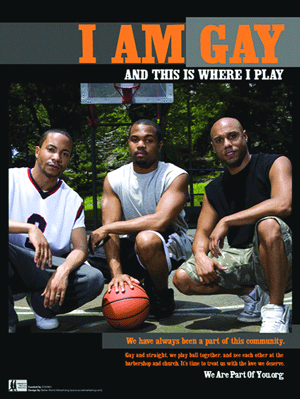African-American gay activists launch campaign to emphasize they have always been there
<<One of the three ads used in the New York State Black Gay Network Campaign, showing gay men at play and at prayer.
The New York State Black Gay Network inaugurated an effort on August 22 to counter anti-gay bias in the African-American community.
“We’re here today to launch a campaign to save black gay men’s lives,” said Mark McLaurin, the Network’s executive director, at a press conference held at Broadway and 125th Street. “It is a campaign aimed at the heart of our community. It is a campaign that originates from the heart of the same community. We launch this campaign not in Chelsea or the Village, but in Bed Stuy and Brownsville, we launch this campaign not from the Lower East Side, but from right here in Harlem.”
As McLaurin spoke, two 40 by 70-foot billboards were being placed on the side of an apartment building behind him. The first showed three young black men posed on a basketball court with text that read, “I am gay and this is where I play.” Another line read, “We have always been a part of this community.” Viewers were directed to the Web site http://www.wearepartofyou.org.
Three versions of the ad, which are backed by $350,000 from the city’s health department, will run on bus shelters and in the subways around the city though not on Staten Island. McLaurin said the Network, which has 16 member organizations throughout the state, had paid for the posters and billboards to be displayed for 30 days and they are trying to raise funds to buy additional time.
“All of us stand here together in common purpose to say enough is enough,” McLaurin said. “We can no longer allow our lives to be caricatured and demonized and condemned and somehow placed outside the circle of life in the black community when, in truth, as the campaign so simply, but plaintively declares, we have always been here. From the basketball courts to the corner bodega, from the church sanctuary to the school classrooms, black gay men have always played an integral role in the community.”
Joining McLaurin was Congressman Charles Rangel, a leading Democrat who represents Harlem.
“Part of our job is to make certain that everyone is treated decently, fairly and given opportunity,” Rangel said. “It’s so important that when we can look back on this, the same way we looked back on colored and white lavatories, the same way we viewed intimidation at the lunch counters… that those of us who stand here together would know that in the days ahead when people asked ‘What did you do?’ we can say we stood up wherever we went.”
The ads are seen as not only battling anti-gay bias. Activists also believe that homophobia contributes to the spread of HIV among gay men.
“To my straight brothers and sisters…you may even turn a blind eye to the horrendous epidemic in this community that is HIV and AIDS if that’s what’s in your heart, but be clear that when you do so you are committing genocide,” McLaurin said. “You are forsaking your own and you are creating divisions when our most pressing problems demand unity.”
Also participating in the launch were Assemblyman Daniel O’Donnell, who represents the Upper West Side, City Councilman Robert Jackson, who represents Harlem, City Councilwoman Melissa Mark Viverito, who represents East Harlem and a portion of the South Bronx, and Scott Stringer, the Manhattan borough president.
Representatives from the Gay Men’s Health Crisis (GMHC), Harlem United, and People of Color in Crisis, three AIDS groups, also spoke.
gaycitynews.com



































